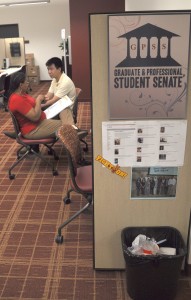Graduate Senate hopes to foster sense of community
USC’s Graduate and Professional Student Senate officials say they hope to create a greater sense of community among graduate and professional students on both the University Park and Health Sciences campuses in the upcoming year.

Office space · The Graduate and Professional Student Senate has moved to a new location in the Ronald Tutor Campus Center. - Hayden Bennett | Daily Trojan
This year, the GPSS offices moved from room 103 of the Student Union to room 224 of the new Ronald Tutor Campus Center, with the new graduate student lounge just two floors above.
“I love it,” GPSS President Jenny Novak said. “I like being located close to USG, like being close to the center of campus, like being close to the lounge.”
GPSS plans to work with all departments this year to foster a community relationship within the university and with alumni. GPSS also hopes to focus on improving social programming, creating a better subsidized transit system, fostering “green” initiatives and increasing summer funding for doctoral students. This year, GPSS is working with a budget of about $1 million, Novak said.
GPSS also hopes to improve its campus visibility.
“It’s still very common to ask a grad student about GPSS and they will have no idea what it is,” Vice President Aliya Hussaini said.
To achieve a greater sense of graduate student community, Public Relations Chair Swati Gupta hopes to focus on leadership events within the graduate student body, including summits, networking opportunities and a new leadership initiative she calls “Project ‘Why?’”
Other upcoming activities include a NFL kickoff party, a boat trip, an ice cream social, a community service trip to the L.A. County Fair with the Undergraduate Student Government, academic workshops and Grad Bar nights.
On Grad Bar nights, GPSS will bring students from USC, UCLA and Caltech together to go to bars around Los Angeles.
Though GPSS is the graduate counterpart to USG, Novak said she thinks that working with graduate students is different than working with undergraduates.
“A lot of graduate students are older, so there’s a difference in maturity … graduate students are [also] more segregated by programs,” she said. “They have bigger [academic] projects and a different lifestyle … It’s difficult to build a community.”
Gupta said graduate students don’t want as many social activities as undergraduates, but still have the same needs, including later operating hours at Doheny Library and more “off-campus ventures.” They also have unique improvements they’d like to see, such as increased technical training for teacher’s assistants and a way to bridge the gap between distance and on-campus learning.
“[Graduate students have] a lot more work, [and they’re] not looking to get involved,” Gupta said. “[Academics are] more important for them.”
GPSS is also trying to take advantage of its new graduate student lounge, specifically through different events. Weekly lunches are held Mondays in the lounge where students bring their lunches and GPSS provides free coffee and dessert.
“I think the grad lounge is a great addition to the campus center and really shows that GPSS is trying to unify all of the disciplines of graduate students and allow for more conversations and interactions,” said Ben Kastroll, a graduate student studying engineering management.
